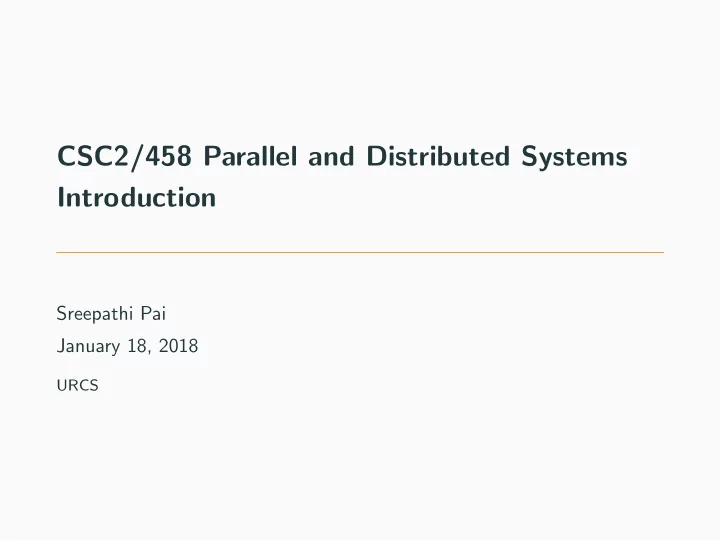

CSC2/458 Parallel and Distributed Systems Introduction Sreepathi Pai January 18, 2018 URCS
Outline Administrivia Parallel Computing Distributed Computing
Outline Administrivia Parallel Computing Distributed Computing
People • Instructor: Dr. Sreepathi Pai • E-mail: sree@cs.rochester.edu • Office: Wegmans 3409 • Office Hours: By appointment, but I have an open door policy (10AM–5PM) • TA: Haichuan Yang • Will join us early February.
Places • Class: CSB 209 • T,R 1525–1640 • Course Website • https://cs.rochester.edu/~sree/courses/csc-258/ spring-2018/ • Blackboard • Announcements, Assignments, etc. • Piazza • ?
Pre-requisites • CSC 256: Operating Systems • Processes, Threads, Scheduling • Synchronization: Mutexes, Semaphores • Interprocess Communication • CSC 254: Programming Language Design and Implementation • Parallel Programming Constructs • Concurrency This is a non-exhaustive list.
References • No required textbooks for this class • But a lot of reading! • Books and materials have been placed on reserve • Some online, some in Carlson Library • See Blackboard for information on accessing Reserves
Grading • Homeworks: 15% • Assignments: 60% (6) • Project: 25% (up to 2 person teams) There is no fixed grading curve. See course website for late submissions policy.
Project Expectations • Depends on number of people in team • May put up a list of projects as suggestions • You’re free to do your own project • Project report • Project presentation
Academic Honesty • Unless otherwise stated, you may not show your code to other students • You may discuss, brainstorm, etc. with your fellow students but all submitted work must be your own • All help received must be acknowledged in writing when submitting your assignments and homeworks • All external code you use must be clearly marked as such in your submission • Use a comment and provide URL if appropriate • If in doubt, ask the instructor All violations of academic honesty will be dealt with strictly as per UR’s Academic Honesty Policy.
Outline Administrivia Parallel Computing Distributed Computing
Parallel Machines are Everywhere • Starting 2004, all desktop CPUs have multiple “cores” • Even most mobile phones have multiple CPUs! • Why?
Performance Equation T = W × t P • T : Total time • W : Amount of Work (e.g. operations) • t : Average time per work • P : Average parallelism in work
Exercise 10 34 342 20 71 123 101 589
Performance Issues in Parallelism • Goal of parallel programming is scalability . • N processors will make program N times faster (compared to 1 processor) • Serialization inhibits scalability • May be inherent to workload • May result from machine • Usually manifests as load imbalance or underutilization
Correctness Issues in Parallelism • Why can we do the addition in parallel?
Correctness Issues in Parallelism • Ordering in Serial programs • How do you debug serial programs? • Ordering in Parallel programs • How do you debug parallel programs?
Outline Administrivia Parallel Computing Distributed Computing
Distributed Computation Can we break up a program so its parts run on different computers? Each part communicates with the others using messages.
Why distribute? • To parallelize • Problem can be solved by one computer, but you want it faster • To scale • Problem can be solved by one computer, but there are lots of problem instances to be solved • Too big a problem for one computer • Inherently distributed
Implications of Distribution • Location • Distributed State
Distributed Systems in Real Life
Distributed Systems in Real Life: Somewhat obvious • The telephone system • The Internet • The banking system • The traffic system • ...
Distributed Systems in Real Life: Not so obvious • Cellular systems • Plants • Animals • Fungi
Challenges in Distributed Systems • Correctness • Termination In the presence of: • Delays • Failures
Recommend
More recommend